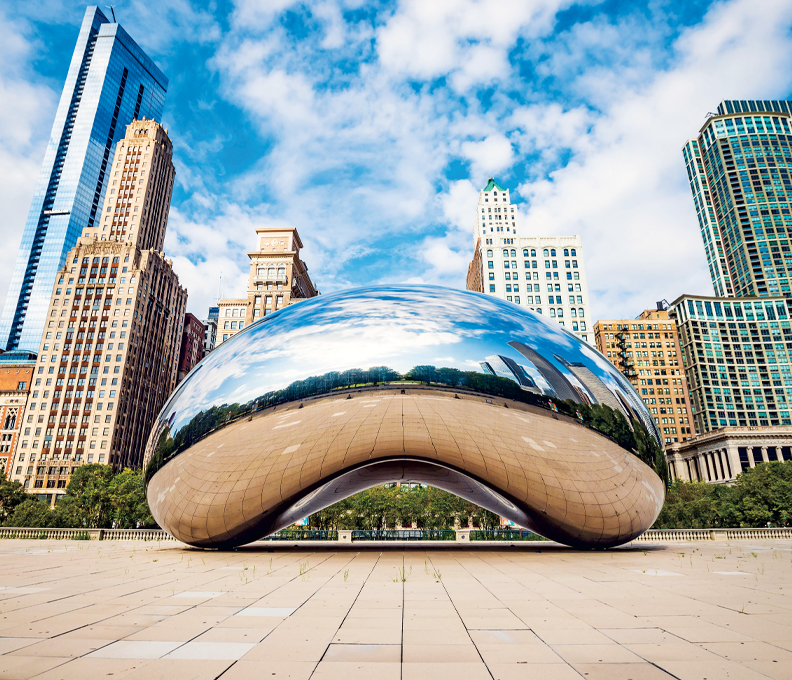LGBTQ Travel Is Big Business—And the Industry’s Betting on It
As politics challenge DEI, the travel industry doubles down on LGBTQ inclusion—driven by loyalty, visibility, and powerful spending
by Todd Plummer
June 10, 2025

Pride & Prejudice / Illustration: Sam Prentice Jones
At the Great Place to Work for All Summit in April, Marriott CEO Anthony Capuano made a statement that instantly resonated with LGBTQ travelers everywhere. At a time when corporate “diversity, equity and inclusion” (DEI) initiatives feel more politically charged than ever, both in America and abroad, Capuano made clear his company’s stance.
Recalling conversations with his mentor, the former chairman Bill Marriott, Capuano said that the ebbs and flows of politics do little to change Marriott’s core values. “The winds blow, but there are some fundamental truths for those 98 years,” said the CEO. “We welcome all to our hotels and create opportunities for all—and fundamentally those will never change. The words might change, but that’s who we are as a company.”
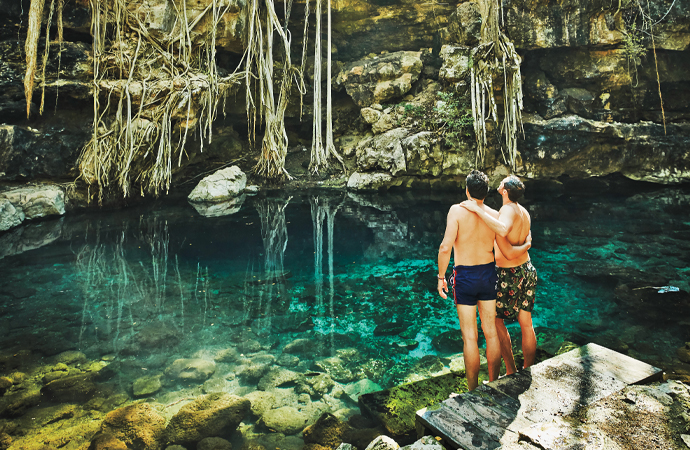
Tourists in Yucután, Mexico / Photo: Getty Images
After all, hospitality at its core is about making people feel welcome—and to exclude a significant portion of that market, regardless of political leaning, would be bad business. While long considered a niche demographic, LGBTQ travel now represents one of the most influential segments in tourism. The global LGBTQ market was valued at more than $320 billion in 2024 and is forecasted to exceed $630 billion by 2033.
Despite shifting political dynamics, LGBTQ tourism is more and more part of travel’s status quo. The sector has gone from fringe to an increasingly routine and entrenched aspect of the trade. Global brands employ dedicated staff to cater to this market, and on-the-ground independent operators that focus on this space are flourishing. There might be a volatile and uncertain political climate, but there is absolutely nothing uncertain about this segment’s purchasing power.
DEI, But Why?
In America, some of the earliest diversity, equity, and inclusion efforts date back to the Civil War, and also after both World Wars, when employers encouraged preferential hiring for veterans and their families. With the Randolph-Sheppard Act in 1936, President Franklin D. Roosevelt mandated that the federal government give preference to products made by the blind.
Nearly a century later, corporate DEI swelled during the presidencies of Barack Obama and Joe Biden. By 2022, The Economist noted that employees hired under DEI frameworks had more than quadrupled since 2010. Then, in January, President Donald Trump signed an executive order demanding that all federal DEI programs be shut down.
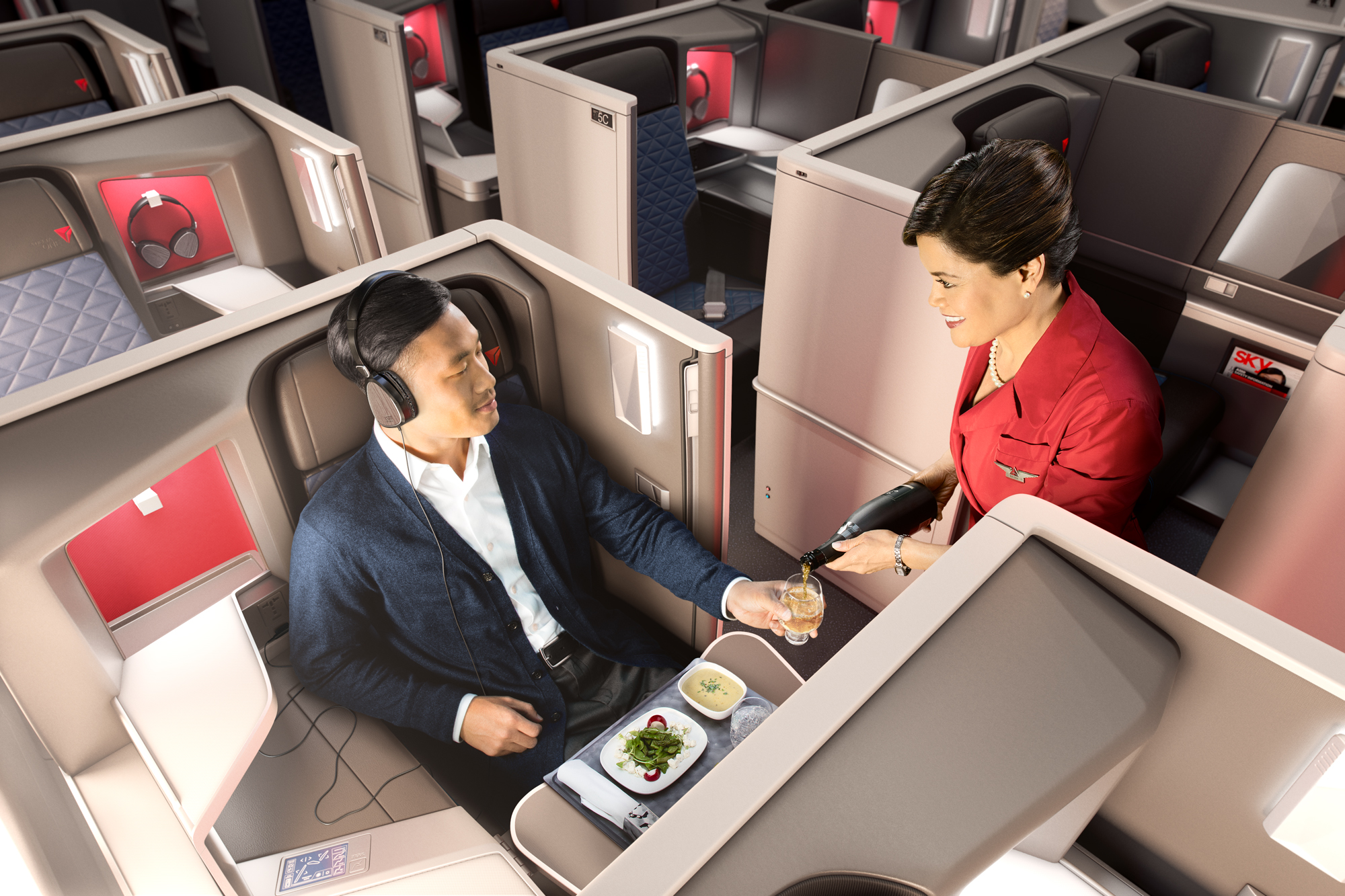
Photo: Courtesy of Delta Air Lines
In response to this political pressure, some industry giants, including Amazon, McDonald’s, and Walmart, followed suit and scaled back their DEI initiatives. In early 2025, Target announced the discontinuation of its “Belonging at the Bullseye” strategy, and its stock price suffered in the process, dropping approximately 30 percent YTD as of the writing of this article.
Others, however, doubled down, including Delta Air Lines. During a recent earnings call, Delta confirmed that it would not be scaling back its DEI efforts. And the small group adventure-travel company Intrepid Travel announced in March that it would double its financial commitment to BIPOC-owned businesses, diverse content creators, and ethical storytelling.
As political winds shift, DEI’s public perception has become deeply polarizing, but the effects of this rightward shift on travel are clear. According to a survey conducted by IGLTA, the International LGBTQ+ Travel Association, LGBTQ people are less likely to travel to destinations with anti-LGBTQ laws.
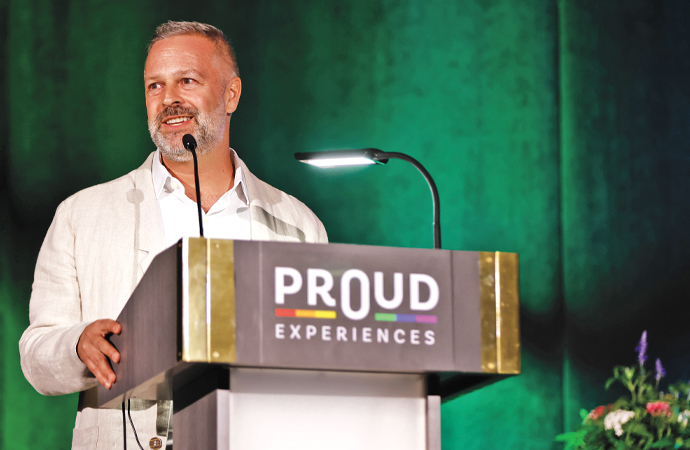
RX event director Simon Mayle at Proud Experiences / Photo: Courtesy of Proud Expo
In the wake of Florida’s controversial “Don’t Say Gay” law, HB 1557, in 2022, which prohibited instruction on sexual orientation or gender identity in schools, more than 80 percent of respondents perceived Florida as “somewhat or very unwelcoming,” and 52 percent of respondents expressed hesitancy or outright refusal to book personal or business travel to Florida due to this policy.
Moving forward, the challenge for companies, especially in the travel space, will be how to balance political pressures with consumer expectations.
The Travel Trade Embraces LGBTQ
On the travel industry’s back end, buyers and sellers are in constant dialogue about appealing to the lucrative LGBTQ market. After five successful editions of its LGBTQ travel trade conference, Proud Experiences, events company RX has announced that this year it will merge the event with its flagship ILTM North America conference this October in the Bahamas.
According to RX event director Simon Mayle, Proud Experiences was consistently met with enthusiasm, but attendees expressed a desire to broaden the conversations around LGBTQ travel within the greater luxury travel market. Each supplier, travel advisor, and hotelier presenting at ILTM North America will have the chance to flag LGBTQ-tailored products.
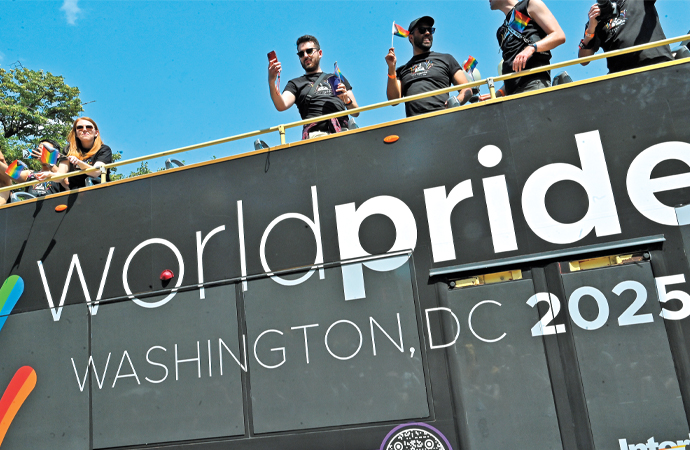
WorldPride Washington, DC / Photo: Getty Images
Merging Proud Experiences with ILTM is therefore not an erasure but an integration, signaling the travel trade’s broader acceptance of the LGBTQ market. “At the end of the day, LGBTQ is not a niche anymore,” says Mayle. “We all have LGBTQ clients, full stop.” One key difference in response to the current political climate, Mayle notes, is how travel companies are doing away with “DEI Officers” in lieu of “People Officers,” or mission statements promoting “inclusion” as opposed to literal “DEI.”
“The U.S.’s current political regime is driving away certain terminology,” says Mayle. “But the industry is good, and far more advanced from where it’s ever been. And at the end of the day what politicians listen to is big business.”
LGBTQ Credentials Gain Importance
The numbers are clear: According to leading LGBTQ market research firm Community Marketing & Insights, 90 percent of respondents consider a destination’s reputation as being LGBTQ-welcoming when making their travel plans. In order to guide this decision-making process, LGBTQ travelers often rely on third-party credentials.
In Mexico City, for instance, the tourism company Queer Destinations offers a “Queer Destinations Committed distinc-tion.” This recognition marks the completion of a rigorous review and comprehensive training process to ensure brands or destinations are prepared to welcome LGBTQ guests.
The distinction is growing in popularity—last year, the Guggenheim Museum Bilbao became the first museum to secure the status, and Mundo Imperial Entertainment & Hospitality became the first hotel chain in Mexico.
In Canada, the 2SLGBTQI+ Chamber of Commerce, funded by the government of Canada, offers a similar “Rainbow Registered” accreditation program, covering more than 430 Canadian businesses.
Similar credentials are lacking in the United States. Based in Fort Lauderdale, Florida, the International LGBTQ+ Travel Association launched an “ILGTA Accredited” program in 2023. While not a training or education course, this robust audit declares that inclusivity efforts are in place.
There are currently 33 ILGTA-accredited hotels globally, including the W Costa Navarino in Greece and The Red Carnation Hotel Collection, which includes Xigera Safari Lodge in Botswana and The Milestone Hotel & Residences in London. Gild Hall, a Thompson Hotel in Manhattan, is the only property in the United States to offer this distinction.
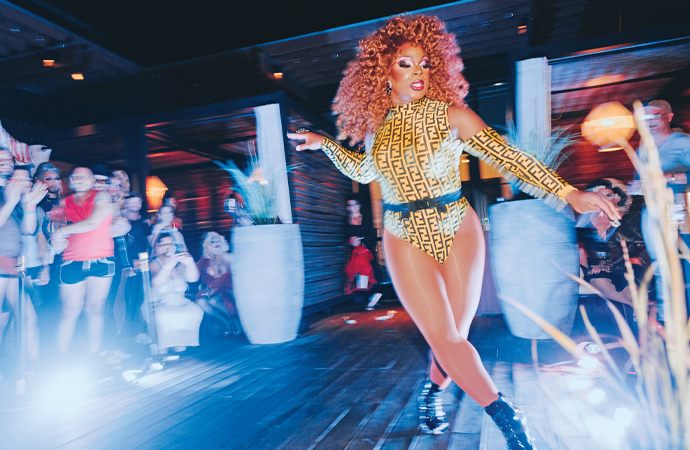
Drag brunch at the Virgin Hotel Nashville, Tennessee / Photo: Courtesy of Nathan Zucker
So why has the United States been slow to adopt such credentials? It might have something to do with the political climate.
“In travel, some companies might not want to overexpose themselves,” says Mayle. “Obviously, the current administration is driving away a lot of terminology around DEI, but we are seeing a big shift towards making all people feel like they belong and their needs are met, no matter what. It’s become less about ‘DEI’ as a term and more about inclusion.”
Hotels Continue To Show Support
Even without explicit accreditations, some of the world’s leading hotel brands continue to show support for the LGBTQ community. During June, Virgin Hotels actively engages the market across its nine global locations with drag brunches, live performances and promotional packages, from Chicago and Nashville to the United Kingdom.
In 2024, Harrah’s Resort Southern California donated $75,000 to San Diego Pride as an official presenting sponsor, and also operates an All-in 4 Change charity initiative that has raised $250,000 to be dispersed to community organizations, including LGBTQ platforms.
It’s the companies that show a dedication to the LGBTQ community year-round, however, that continue to have an impact. Hospitality company Belmond was one of the first to have an LGBTQ advisory board, and employs a dedicated account director for the market. In 2011, Preferred Hotels & Resorts launched its Preferred Pride program, a booking microsite for LGBTQ-welcoming properties from the Preferred portfolio. Guests booking through Preferred Pride receive a $50 hotel credit and welcome amenity. Relaunched in 2023, the program includes approximately 200 hotels globally.

Gay Surf Week in Costa Rica / Photo: @BTX_SS
To participate in the program, Preferred Pride hotels must operate in destinations that do not criminalize homosexuality, offer diversity training to all employees, and actively support the LGBTQ community through charitable donations, volunteer days or Preferred Pride initiatives.
“It’s been a very successful program, having generated over $50 million in sales since the beginning,” says Rick Stiffler, senior vice president of global sales and founder of the Preferred Pride program. “What’s interesting is we’re seeing Preferred Pride being booked by everyone—members of the community and allies. It’s not just limited to gay people. People do it because they like what it stands for.”
New Frontiers In LGBTQ Travel
While the global Pride festival circuit continues to hold political and commercial relevance, gay travel has evolved into something much more nebulous and omnipresent. On one hand, this year’s WorldPride Washington, DC 2025 marks the capital’s 50th year of Pride celebrations, and is slated to be the city’s largest LGBTQ endeavor yet.
On the other hand, gay travel is also flourishing in places that were previously unthinkable. In Jodhpur, India, in the desert state of Rajasthan, the boutique operator House of Rohet has hosted a number of LGBTQ weddings at its hotels Mihir Garhand Rohet Garh. “LGBT travelers prefer boutique properties like ours, as they have a lot of character and are intimate,” says managing director Avijit Singh.

Photo: Courtesy of Bawah Reserve
Even countries where LGBTQ people face the most significant legal challenges are slowly opening up to gay travelers. In Indonesia, a predominantly Muslim country, there are pockets of acceptance to be found, including the private island resort Bawah Reserve, which “dearly welcomes” LGBTQ guests, per a spokesperson. According to the Saudi Tourism Authority website, a question about LGBTQ visitors in the FAQ section states, “Everyone is welcome to visit Saudi”—despite the kingdom officially criminalizing same-sex activity and the gender expressions of trans people.
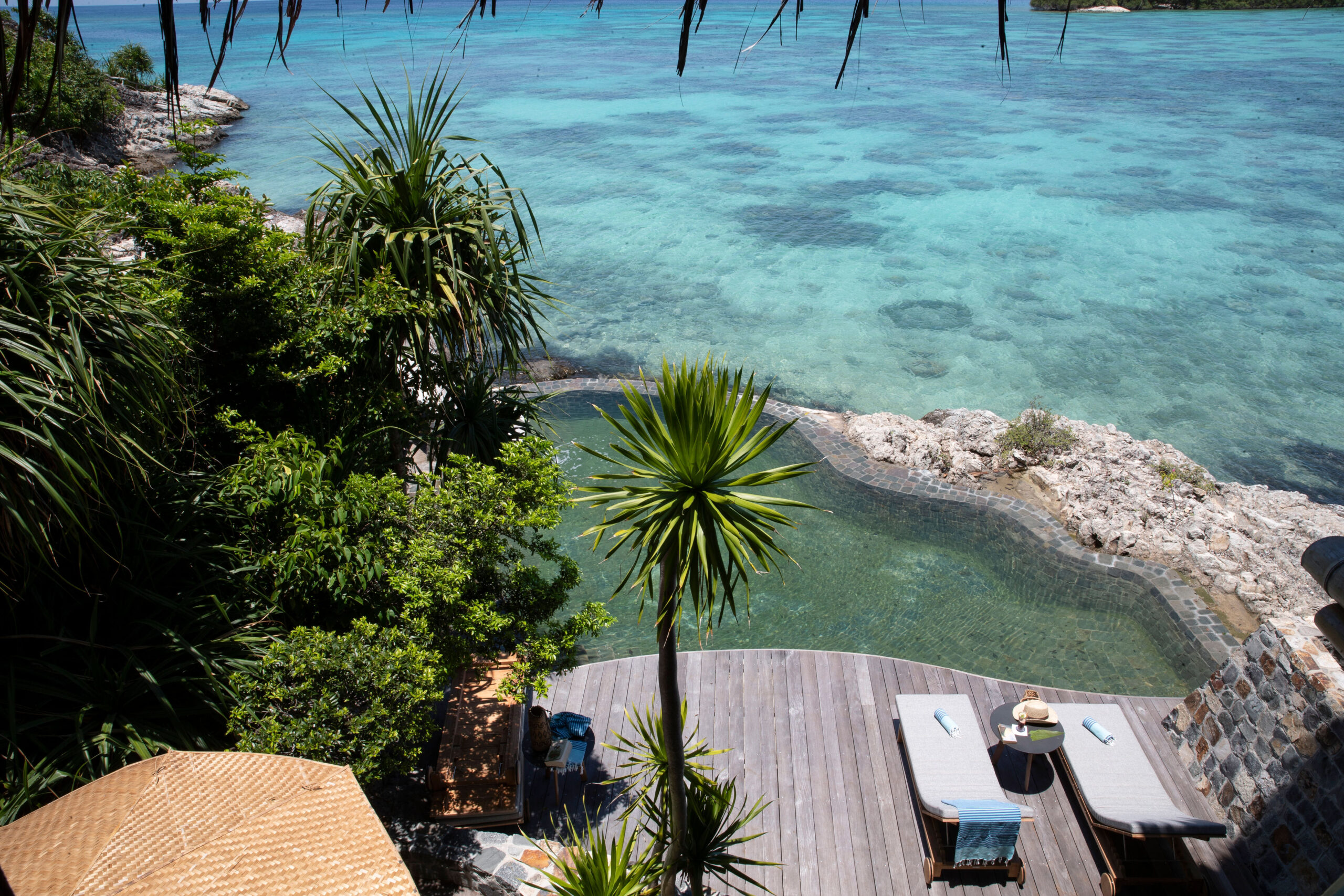
Photo: Bawah island, Riau island, Indonesia. Courtesy of Bawah Reserve
2025 also marks a golden age for LGBTQ small-group travel companies. Puckett Excursions, for instance, markets itself as an LGBTQ travel company under the motto, “Never fit in.” Founder Chris Puckett organizes adventure-forward excursions to Namibia, New Zealand, Southeast Asia, and more. And content creator Joe Santini leverages his Instagram following to find attendees for his company, Gay Surf Week, which organizes LGBTQ retreats in Mexico and Costa Rica.
From the National Mall to the remotest stretches of beach in Indonesia, the face of LGBTQ travel is changing. Gay travel trends for 2025 are all about how the industry will continue to keep pace with the community’s evolving needs.


